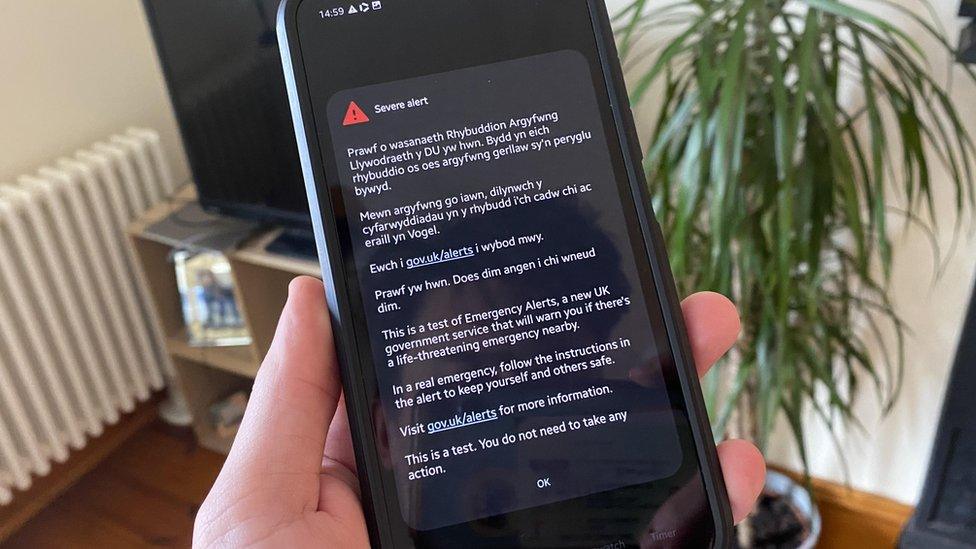Emergency alert test fails to sound on some phones
- Published
Watch the moment sirens start on phones across the UK
Smartphones which did not receive a nationwide emergency alert test will be part of a review into the trial of the alarm.
While millions of people across the UK heard an alarm on their phones at 15:00 BST on Sunday, many others did not.
The government was testing an alert that could be used to warn about dangerous situations including fires, flooding or terror attacks.
The alarm lasted for around 10 seconds on 4G and 5G devices.
Many people on social media reported the alert went off one minute earlier or later than planned, when a loud, buzzing alarm rang out and the words "severe alert" flashed up on their phones' screens.
And some said they did not receive the alert at all.
Twitter user Lucy wrote: "Kind of disappointed to not get one."
Another tweeted: "15:30 and still waiting for my national alert to warn me of impending doom."
While a third said: "I did not turn off alerts but I never got the text or the noise alert!"
A Cabinet Office spokesperson acknowledged that the alert did not reach some mobile phones, adding it "will be looking at this as part of our review of the test".
The department also said engineers had spotted a trend of phone functions failing to work afterwards, adding that officials were in the early stages of analysing the results of the trial run.
Many users of the Three mobile network said they did not receive the alert.
A spokesperson for the company later said it was"aware that a number of customers have not received the test alert. We're working closely with the government to understand why and ensure it doesn't happen when the system is in use".
Andrew Hamilton, a member of the UK Youth Parliament for North Down, who is also blind, called the alert "inaccessible".
He told BBC News: "I use a screen reader but because of the alert sound, the screen reader couldn't tell me what the alert was about."
The government had previously advised that those with 2G or 3G devices would not get the alert, along with phones that were off or in aeroplane mode.
People were further advised to ensure their phones had all the latest software updates, including iPhones running iOS 14.5 or later and Android phones and tablets running Android 11 or later.
In Wales, the alert included a translation error as the words "others safe" appeared in the message as "eraill yn Vogel" rather than "eraill yn ddiogel" in Welsh.
"Vogel" does not mean anything in Welsh, as there is no letter V in its alphabet - although Vogel is a ski resort in Slovenia.
People who do not wish to receive future alerts can opt out using their device settings.
Deputy prime minister Oliver Dowden warned beforehand that the alarm would be "a bit inconvenient and annoying", as well as "irritating".

Fans check their phones for the emergency alert during the Betfred Super League match at the DW Stadium, Wigan
However, he added it "could be the sound that saves your life" in the future.
Mr Dowden also denied criticism the alert was an example of nanny statism as he appeared on the BBC's Sunday with Laura Kuenssberg programme.
He said: "If you look at countries around the world, whether it is the United States, Canada, Japan and elsewhere, they have emergency alerts on phones as another tool in the toolkit of keeping people alerted during an emergency."
Drivers were warned not to pick up their mobile phones during the test as it would still be illegal.
Drivers caught holding a phone behind the wheel face six penalty points and a £200 fine.
Meanwhile, the National Centre for Domestic Violence warned people with hidden mobile phones to turn off the alerts to avoid revealing the location of any secret devices.
Watch UK alert go off (again, or if you missed it)
While the alert is intended to be used in emergencies in the future, some took to social media to poke fun at people who were surprised to see the alert flash up and hear the siren sounding on their phone.
Love Island star Jessie Wynter posted a video on TikTok of fellow contestant Will Young appearing perplexed and asking friends, "what does that mean?"
Related topics
- Published23 April 2023

- Published22 April 2023

- Published23 April 2023
